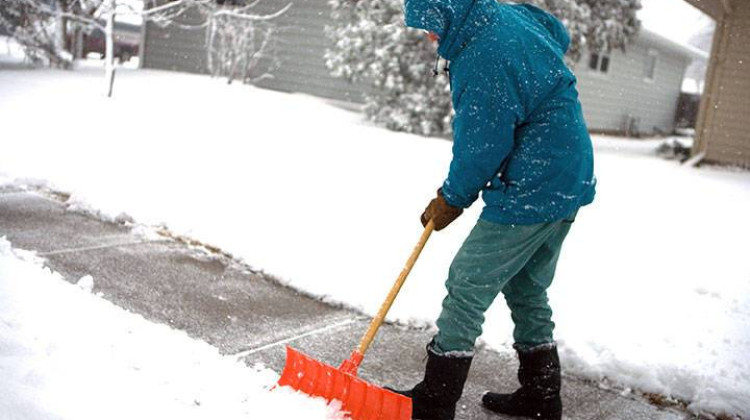 IMPD Body Cam Coordinator Steve Turner says after six meetings, all but one citizen spoke in support of the program. But he says there is a common concern about how and when footage will be released. (Drew Daudelin/WFYI)
IMPD Body Cam Coordinator Steve Turner says after six meetings, all but one citizen spoke in support of the program. But he says there is a common concern about how and when footage will be released. (Drew Daudelin/WFYI)
The Indianapolis Metropolitan Police Department will launch a pilot program soon to test the use of body cameras on its officers. The department held a series of meetings around the city to gather community feedback, and about 40 people gathered at an east-side event Thursday night.
IMPD Body Cam Coordinator Steve Turner says after six meetings, all but one citizen spoke in support of the program. But he says he heard a common concern about how and when body cam footage would be released.
“What I am hearing is, 'We want to see the video, the good, the bad, the ugly, we want to see it,'" Turner says. "And if it's not a violation of someone's rights, First Amendment rights, etc, or HIPAA violation within the medical field, they want it, and I think we have that obligation to provide that to them.”
Residents at the east-side meeting asked questions about a variety of issues, most concerning specific ways in which the program would be implemented. Some asked about when officers have to turn on their cameras, and when they can decide not to.
Turner says many of these kinds of details are undecided, and that community feedback and results of the pilot program will guide their decision-making. But he says cameras will automatically turn on when an officer removes his or her firearm from their holster, and officers will be trained to always turn their camera on before the start of an interaction.
In certain situations, Turner says, citizens involved in the interaction might not want a recording to be made. He gave the example of a police call made for the natural death of a family member, and says IMPD is discussing where to go on issues like this.
Local resident Charles Tony Knight says an officer should need their supervisor's consent before turning off the camera during any interaction.
Knight says he supports the program, but is also worried about who gets to decide when footage is released. He told IMPD officials a five-person commission should be created, with some seats reserved for citizens, to vote on each case.
“You gotta have some transparency as to who can decide what should be released. It can't just be the police department or the prosecutor's office by themselves deciding,” Knight says.
State law dictates body camera footage must be retained for a minimum of 190 days, but that time can be extended indefinitely, which typically happens when footage is connected to an ongoing legal case or a filed complaint.
Lavonna Jefferson lives on the east side and says she supports the program. But she says she's wary, like others, about officers being able to turn cameras off in certain situations.
"There's always three sides to the story, you know, your side my side and the truth," Jefferson says, "and if the camera can be the mediator in between, why not?"
Turner says money will be their biggest hurdle in getting the program started. It's expected to cost around $3 million a year to maintain (much of that cost, IMPD says, is for video storage), and that cost will likely fall to Marion County taxpayers.
Body camera programs in police departments have become commonplace in large cities. IMPD has flirted with the idea, running a much smaller pilot program in 2014. But they've cited funding and logistical concerns ever since.
Turner says storage costs for body camera footage have been cut in half in the last five years. And he says the department will benefit from waiting, since they can evaluate the successes and failures of body camera programs implemented around the country.
"The majority of the officers want it, the chief wants it, the mayor wants it," Turner says. "But at the end of the day, if the money's not there we're not gonna get them."
The pilot program will start in about one month. IMPD will test camera systems from three different vendors with officers and supervisors on middle shifts in the North, East, and Southeast districts.
Turner will write a report after it ends, which will include community feedback, and give it to the chief of police for consideration.
 DONATE
DONATE







 Support WFYI. We can't do it without you.
Support WFYI. We can't do it without you.